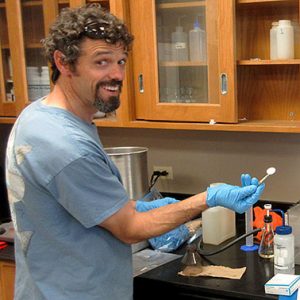
Nathan Hall
Assistant Professor
Dr. Hall’s research seeks to understand the top down and bottom up drivers of phytoplankton biomass and community composition in lakes, rivers, and estuaries. I am particularly interested in how natural ecosystem characteristics such as residence time, grazer communities, and vertical mixing regimes interact with nutrient and light availability to affect bloom dynamics, phytoplankton community composition, and water quality conditions. Recent studies have underscored the critical role of interactions between hydrological forcing and nutrient loading in determining phytoplankton biomass and community structure, including toxic harmful algal bloom species.
Areas of expertise/current research
- Harmful algal blooms
- Physical/ biological coupling
- Aquatic biogeochemistry
- Numerical modeling
Teaching
- Co-Instructor. ENEC 698 Capstone Project
- Guest lecturer. ENEC 471 Human Impacts on Estuarine Processes, MASC 104 Biological Oceanography, MASC 470 Estuarine and Coastal Marine Sciences
- Independent Research Advisor. ENEC 693H, Honors Thesis Independent Study
Service
- North Carolina Marine Fisheries Commission, Standing Committee on Habitat and Water Quality (2019-present).
- Scientific Advisory Council, North Carolina Nutrient Criteria Development Plan (2015-present).
- Core Management Team, NOAA North Carolina Sentinel Site Cooperative (2017-present).
- Cape Fear River Partnership Water Quality Team member (2017-present).
Select current research projects
- Understanding thermal stratification as a key driver of harmful cyanobacteria blooms on the Cape Fear River, NC (Urban Waters Consortium).
- Automation of Water Resources Inventory and Assessments (WRIA) and Contaminant Assessment Program (CAP) reporting for US National Wildlife Refuges (US Fish and Wildlife Service).
- Quantitative evaluation of changing nutrient sources to the Chowan River. Clean Water Management Trust Fund subcontract through the Albemarle Commission.
- Using citizen science to understand nutrient limitation of algal blooms on the Chowan River: Filling critical data gaps and promoting community engagement (NC Sea Grant and Kenan Foundation Community Collaborative Research Grant).
- Defining the nitrogen budget for Falls Lake (North Carolina Policy Collaboratorium).
- Third party hydrological data review. (North Carolina Policy Collaboratorium).



